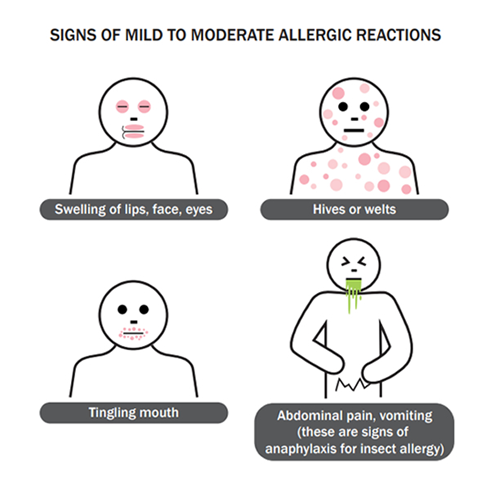Before starting antimicrobial therapy, the nurse assesses a patient for possible drug allergy. Which of the following complaints should alert the nurse to a drug allergy?
Headaches
Hives or shortness of breath
Diarrhea
Nausea
The Correct Answer is B
A. Headaches:
Headaches are a common symptom that can occur for various reasons, including stress, tension, dehydration, or as a side effect of medications. While headaches can sometimes occur as a side effect of certain drugs, they are not specific indicators of a drug allergy. Allergic reactions to medications typically involve other symptoms such as rash, hives, itching, swelling, or respiratory symptoms.
B. Hives or shortness of breath:
Hives (urticaria) are raised, red, itchy welts on the skin that can occur as an allergic reaction to medications. They are a common manifestation of drug allergies. Shortness of breath (dyspnea) can occur as part of a severe allergic reaction known as anaphylaxis. Anaphylaxis is a life-threatening allergic reaction characterized by a rapid onset of symptoms, including difficulty breathing, swelling of the throat or tongue, rapid heart rate, and low blood pressure. Both hives and shortness of breath are significant signs of a potential drug allergy and require immediate attention.
C. Diarrhea:
Diarrhea can occur as a side effect of medications, including antibiotics. However, it is not typically a specific indicator of a drug allergy. Diarrhea is more commonly associated with gastrointestinal disturbances or as a reaction to changes in gut flora due to antibiotic use.
D. Nausea:
Nausea is a common side effect of many medications, including antibiotics. While it can be bothersome, nausea alone is not a specific indicator of a drug allergy. Allergic reactions to medications typically involve other symptoms such as rash, hives, itching, swelling, or respiratory symptoms.

Nursing Test Bank
Naxlex Comprehensive Predictor Exams
Related Questions
Correct Answer is C
Explanation
A. An infection that is difficult to treat:
This choice describes a challenging infection but does not specifically capture the concept of a superinfection. While superinfections can indeed be difficult to treat, they are defined more specifically as secondary infections that occur due to disruption of the normal microbial flora during the treatment of an initial infection.
B. An infection caused by a weakened immune system:
This choice describes an infection that occurs due to a compromised or weakened immune system, which can indeed increase the risk of developing infections, including superinfections. However, it does not fully encompass the definition of a superinfection, which specifically involves the overgrowth of opportunistic pathogens after the disruption of normal microbial flora by antimicrobial treatment.
C. A secondary infection that occurs when microorganisms normally present in the body are killed by the drug:
This choice accurately describes what a superinfection is. It highlights the key concept that a superinfection is a secondary infection that arises when antimicrobial treatment disrupts or kills the normal microbial flora of the body, allowing opportunistic pathogens to overgrow and cause infection.
D. A drug-resistant infection:
This choice describes an infection caused by microorganisms that are resistant to the effects of antimicrobial drugs. While drug resistance is a significant concern in healthcare, it does not specifically define a superinfection. Superinfections can involve drug-resistant microorganisms, but they are not solely characterized by drug resistance; rather, they are secondary infections resulting from the disruption of normal microbial flora during antimicrobial treatment.
Correct Answer is B
Explanation
A. Headaches:
Headaches are a common symptom that can occur for various reasons, including stress, tension, dehydration, or as a side effect of medications. While headaches can sometimes occur as a side effect of certain drugs, they are not specific indicators of a drug allergy. Allergic reactions to medications typically involve other symptoms such as rash, hives, itching, swelling, or respiratory symptoms.
B. Hives or shortness of breath:
Hives (urticaria) are raised, red, itchy welts on the skin that can occur as an allergic reaction to medications. They are a common manifestation of drug allergies. Shortness of breath (dyspnea) can occur as part of a severe allergic reaction known as anaphylaxis. Anaphylaxis is a life-threatening allergic reaction characterized by a rapid onset of symptoms, including difficulty breathing, swelling of the throat or tongue, rapid heart rate, and low blood pressure. Both hives and shortness of breath are significant signs of a potential drug allergy and require immediate attention.
C. Diarrhea:
Diarrhea can occur as a side effect of medications, including antibiotics. However, it is not typically a specific indicator of a drug allergy. Diarrhea is more commonly associated with gastrointestinal disturbances or as a reaction to changes in gut flora due to antibiotic use.
D. Nausea:
Nausea is a common side effect of many medications, including antibiotics. While it can be bothersome, nausea alone is not a specific indicator of a drug allergy. Allergic reactions to medications typically involve other symptoms such as rash, hives, itching, swelling, or respiratory symptoms.

Whether you are a student looking to ace your exams or a practicing nurse seeking to enhance your expertise , our nursing education contents will empower you with the confidence and competence to make a difference in the lives of patients and become a respected leader in the healthcare field.
Visit Naxlex, invest in your future and unlock endless possibilities with our unparalleled nursing education contents today
Report Wrong Answer on the Current Question
Do you disagree with the answer? If yes, what is your expected answer? Explain.
Kindly be descriptive with the issue you are facing.
